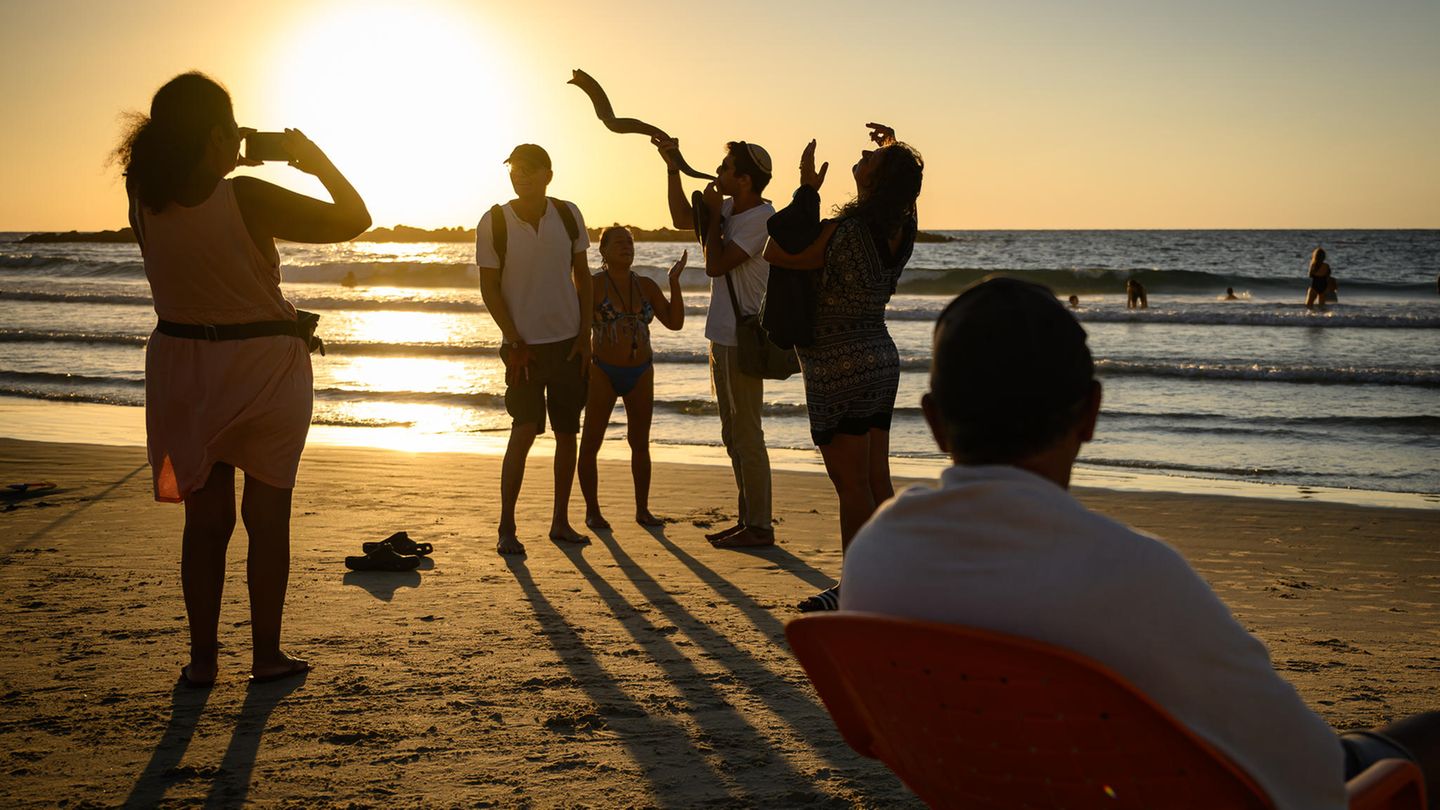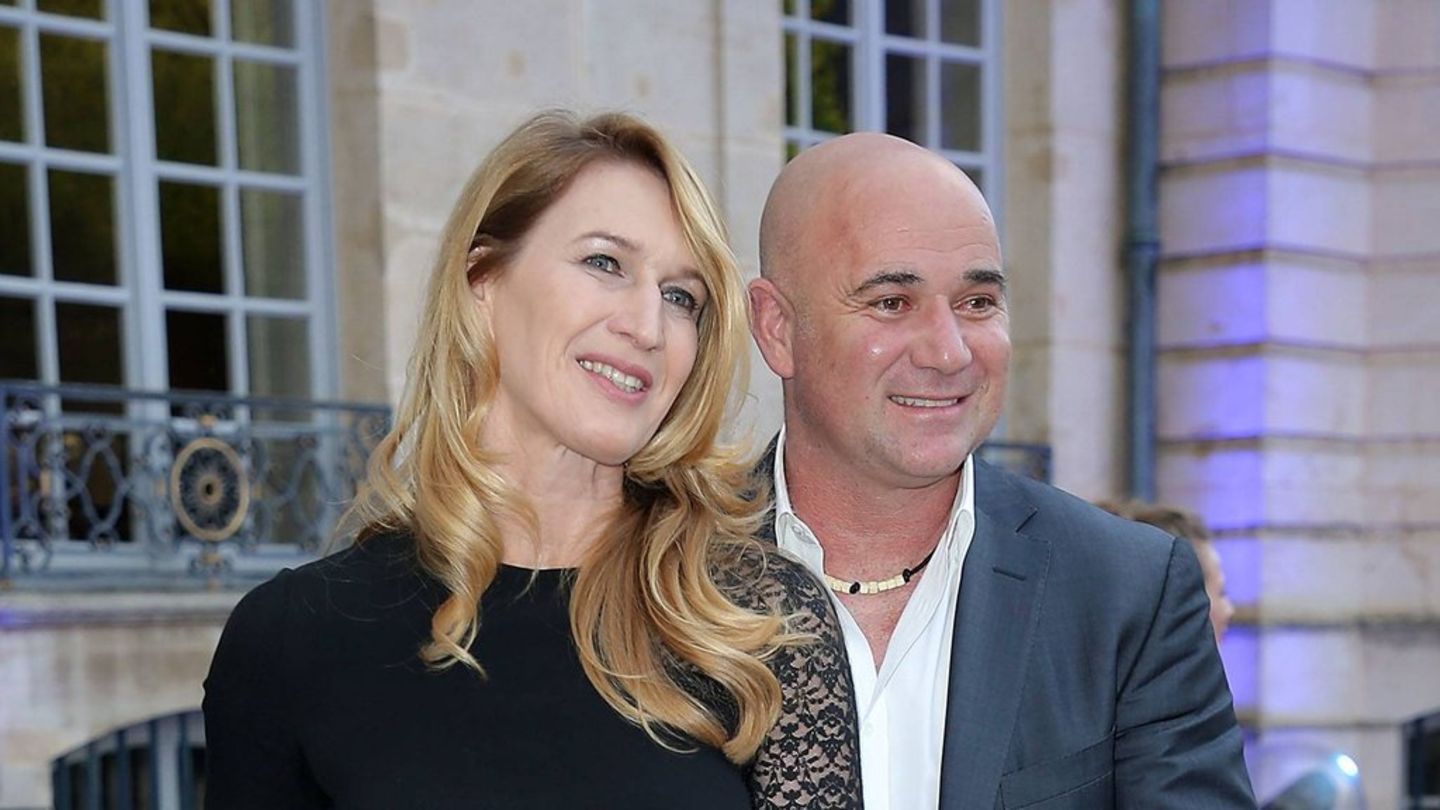One year after October 7th, Israel is fighting on many fronts. Four people in Tel Aviv talk about how they stay calm when it comes to rockets and how they see their own future.
On Tel Aviv’s seafront promenade, a man wearing a yarmulke blows a curved ram’s horn. The heads of joggers, families and couples turn, some pull out their cell phones and film. It’s New Year’s Day in Israel – it’s not just the sound of the horn that resounds from the celebrations of Jewish communities throughout the country. Itay Resnik also sits on the steps, looking alternately at the sunset and at the man with the horn. “Traditions like this make us all proud and happy to be here,” says the 25-year-old. “You can use it sometimes, like in times of war. A bit of morale,” he grins.
October 7, the anniversary of the Hamas massacres and kidnappings, is just days away, and in Israel one religious holiday follows the next. The young man – military-correct haircut, sports trousers – doesn’t actually think much of traditions, he says. But things have changed since October 7th. “I usually go out for a New Year’s party. But this year I just sat with my family and we had a traditional dinner. Now it feels right to be home, with the relatives and rediscover a little bit of who we are than Israelis.”
Resnik listens to the chants of the community on the promenade and smokes a cigarette. He’s actually studying, and at times he was also called into combat. Many of his friends are also reservists in the army, “they motivate me; they make me know how strong we are as a country,” he says. It was a tough year. But now the mood is improving again. Just a few days after Iran fired almost 200 rockets at Israel?
“We’re showing the region who we are again”
Unimaginable a year ago, the arch-enemy has now attacked directly for the second time, rather than through proxy militias. “We’ve shown that we can fend it off. And that we can hit ourselves harder.” The explosions of Hezbollah militiamen’s pagers and walkie-talkies in Lebanon, the killing of Hezbollah chief Nasrallah. “We get good news from the secret services and the army every few days and show the others in the region who we are. That puts us in a good mood.”
Since October 7th, Resnik says he has been more cautious when it comes to Arab-inhabited neighborhoods. And that paid off. On the evening of the Iranian attack, Palestinian assassins from the city of Hebron shot seven people at a train stop in the Arab-inhabited district of Jaffa. “I haven’t been going to Jaffa since October 7th,” says Resnik, “it looks like it will stay that way.”
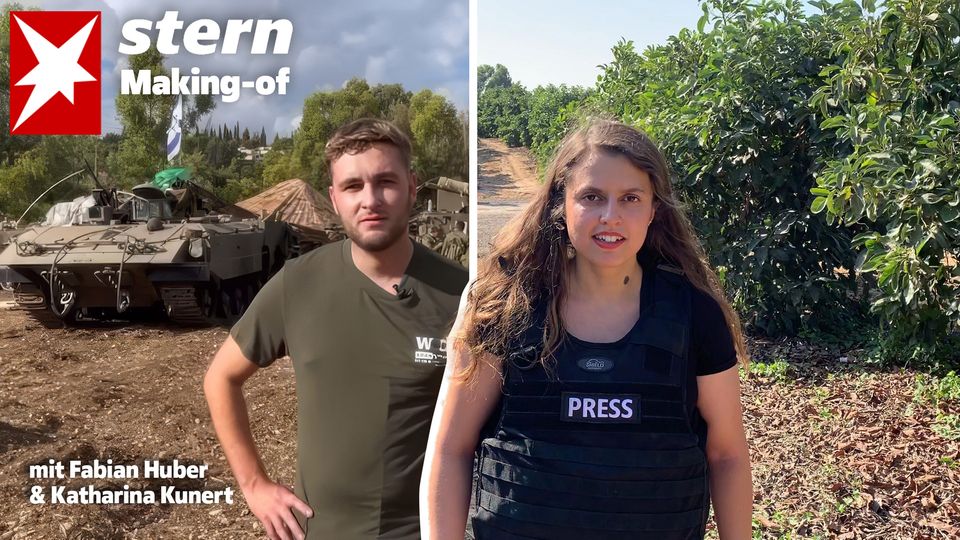
As our reporters have been reporting from Israel since October 7th
09:31 minutes
The stop in Jaffa is decorated with flowers, candles illuminate the almost deserted platform. A young man bends over an extinguished candle and lights it again. Ivan Menjalin always relights the fire when it goes out, he says. The 25-year-old lives nearby and passes the bus stop every day.
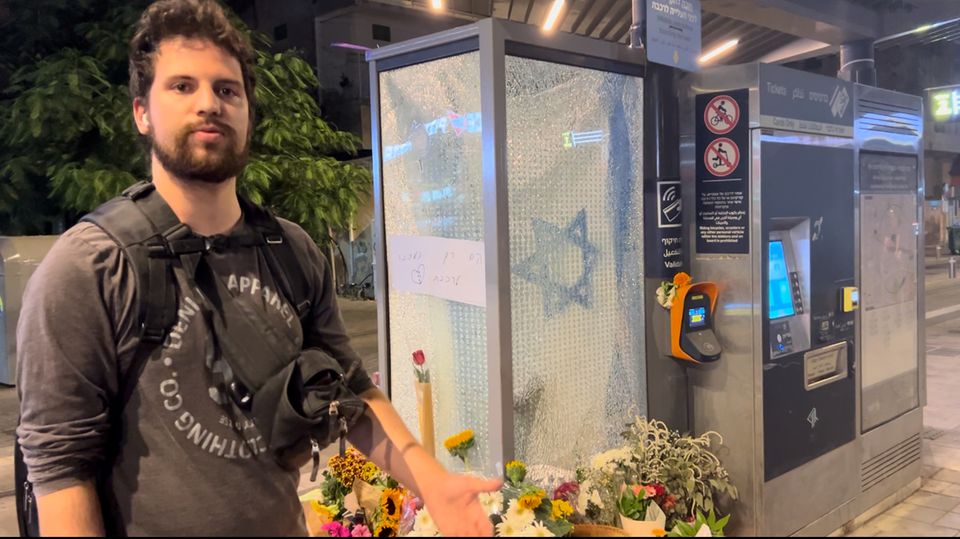
He doesn’t want to get used to the fact that terror is on his doorstep. “I’ll wait another year,” he says. “If the terrorist attacks continue like this, then I’ll move away from Israel.” For him, the rockets are less serious than assassins with guns and knives. “I know how good our air defense system is. But this thing about the terrorists is personal. I don’t want to have to be afraid of everyone who gets on my tram.” Menjalin says he no longer really believes in peace. He studied history and learned a lot about how other countries made peace, even after decades of hostility. “But at the moment it doesn’t feel like I’ll live to see it.
The four of the women sit in a circle in front of the hotel, light each other’s cigarettes and eat holiday cookies. For a year they have been far from home, northern Israel, where Hezbollah is firing rockets and the Israeli army is firing back. Now it has invaded southern Lebanon and wants to push back the enemy militia. Supposedly a limited war. However, civilians in Lebanon fear many deaths and a new occupation. And – like the four women in front of the hotel in Tel Aviv – a long war.
“I don’t know if I’ll be able to go back soon,” says Margalit Malka, 67, “I honestly don’t believe it. I’ve given up hope that everything will go back to the way it used to be.” She doesn’t even know whether she wants to return to Metula, a town near the border with Lebanon. “I’ve been away for so long that I’m starting to put down roots here.”
“Nothing shocks us people from the north anymore”
In Israel’s center you at least have time to run into the bunker, unlike at home. “When Iran attacked, we really felt again: That’s right, we’re at war here too. Not just the edges of Israel. Sometimes you ignore it here on the beach. And suddenly rockets were flying again.” It almost felt like a luxury to have time to go to the basement. Even the children remained quiet that evening. “They’re used to it, as sad as it is.”
Parents took peanut flips for their children, and some adults even ran outside to see the rockets in the sky. “Nothing shocks us people from the north anymore.” Malka shakes her head as if she couldn’t believe what she was saying. All the while she tries to maintain a smile. Then she goes back to the cookies. “Want another one? It’s a holiday after all.”
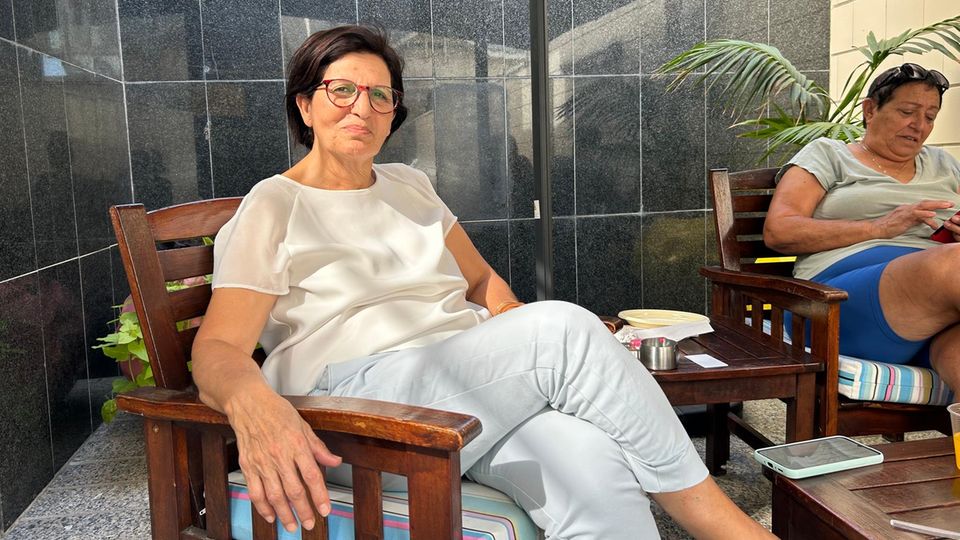
A little boy points to a black and yellow T-shirt and Yael Szlamowicz hands it to him. “October 7th, 6:29 a.m.,” it says. The moment when the alarm signals sounded shortly before the Hamas attack in Israel. “A lot of people buy the T-shirt here,” says Szlamowicz, “because in that moment our whole lives changed for all of us in Israel.” Even for themselves.
Israeli Prime Minister Netanyahu has failed
She has been working as a volunteer since October, selling T-shirts and bracelets, with the proceeds going to the families of the hostages. “Some of them have stopped working completely, that’s the least I can do.” Szlamowicz himself has no abducted or killed relatives. Nevertheless, she still has low points. “I felt very bad when the six hostages were shot in September, just before the army found them. It felt like we were doing this without anyone listening.”
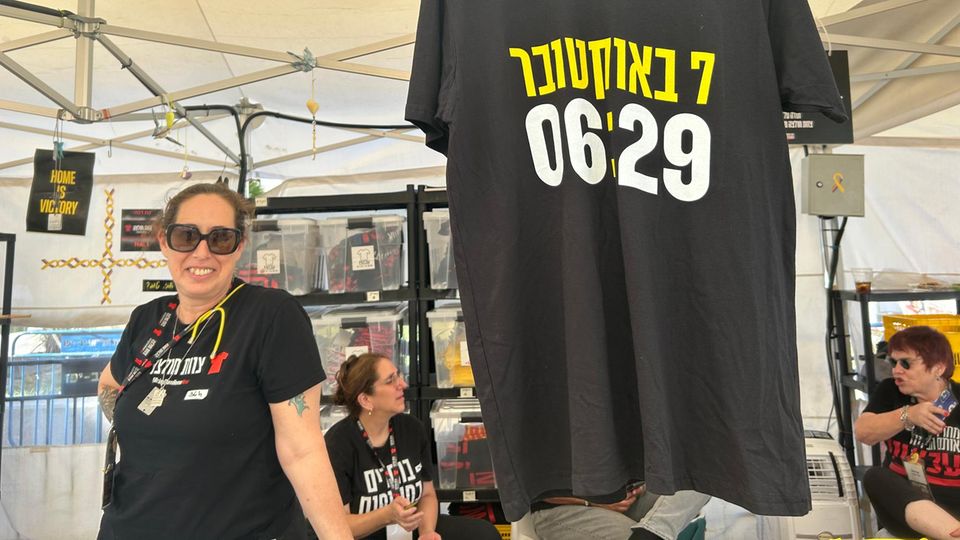
She doesn’t want to talk about politics; the so-called “Hostage Square” should be a non-political place where everyone is welcome. She then says one thing: “The Prime Minister hasn’t brought these people back for a whole year. You can think what you want about him, but that shows that he has failed.” Yael Szlamowicz wants to help the relatives with her work until the last hostage returns home, she says. “I’m exhausted, but others are more exhausted. The fact that the anniversary is coming now and we’re still missing so many people makes me angry. And the anger gives me strength.”
Source: Stern
I have been working in the news industry for over 6 years, first as a reporter and now as an editor. I have covered politics extensively, and my work has appeared in major newspapers and online news outlets around the world. In addition to my writing, I also contribute regularly to 24 Hours World.

